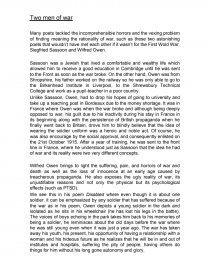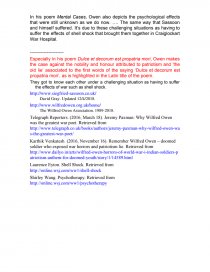Siegfried Sassoon and Wilfred Owen - Two Men of War
Essay by dragomirdiana15 • May 22, 2018 • Essay • 644 Words (3 Pages) • 1,682 Views
Essay Preview: Siegfried Sassoon and Wilfred Owen - Two Men of War
Two men of war
Many poets tackled the incomprehensible horrors and the vexing problem of finding meaning the rationality of war, such as these two astonishing poets that wouldn’t have met each other if it wasn’t for the First Wold War; Siegfried Sassoon and Wilfred Owen.
Sassoon was a Jewish that lived a comfortable and wealthy life which allowed him to receive a good education in Cambridge until he was sent to the Front as soon as the war broke. On the other hand, Owen was from Shropshire, his father worked on the railway so he was only able to go to the Birkenhead Institute in Liverpool, to the Shrewsbury Technical College and work as a pupil-teacher in a poor country.
Unlike Sassoon, Owen, had to drop his hopes of going to university and take up a teaching post in Bordeaux due to the money shortage. It was in France where Owen was when the war broke and although being deeply opposed to war, his guilt due to his inactivity during his stay in France in its beginning along with the persistence of British propaganda when he finally went back to Britain, drove him to blindly believe that the idea of wearing the soldier uniform was a heroic and noble act. Of course, he was also encourage by the social approval, and consequently enlisted on the 21st October 1915. After a year of training, he was sent to the front line in France, where he understood just as Sassoon that the idea he had of war and its reality were two very different concepts.
Wilfred Owen brings to light the suffering, pain, and horrors of war and death as well as the loss of innocence at an early age caused by treacherous propaganda. He also exposes the ugly reality of war, its unjustifiable reasons and not only the physical but its psychological effects (such as PTSD).
We see this in his poem Disabled where even though it is about one soldier, it can be emphasized by any soldier that has suffered because of the war as in his poem, Owen depicts a young soldier in the dark and isolated as he sits in his wheelchair (he has lost his legs in the battle). The voices of boys echoing in the park takes him back to his memories of being a soldier, he reminisces about the old days before the war where he was still young even when it was just a year ago. The war has taken away his youth, his present, his opportunity of having a relationship with a woman and his hideous future as he realizes that he will be in and out of institutes and hospitals, suffering the pity of people, having others do things for him without his long gone autonomy and glory.
In his poem Mental Cases, Owen also depicts the psychological effects that were still unknown as we do now. …. The same way that Sassoon and himself suffered. It’s due to these challenging situations as having to suffer the effects of shell shock that brought them together in Craiglockart War Hospital.
----------------------
Especially in his poem Dulce et decorum est propatria mori, Owen makes the case against the nobility and honour attributed to patriotism and ‘the old lie’ associated to the first words of the saying ‘Dulce et decorum est propatria mori’, as is highlighted in the Latin title of the poem.
...
...

